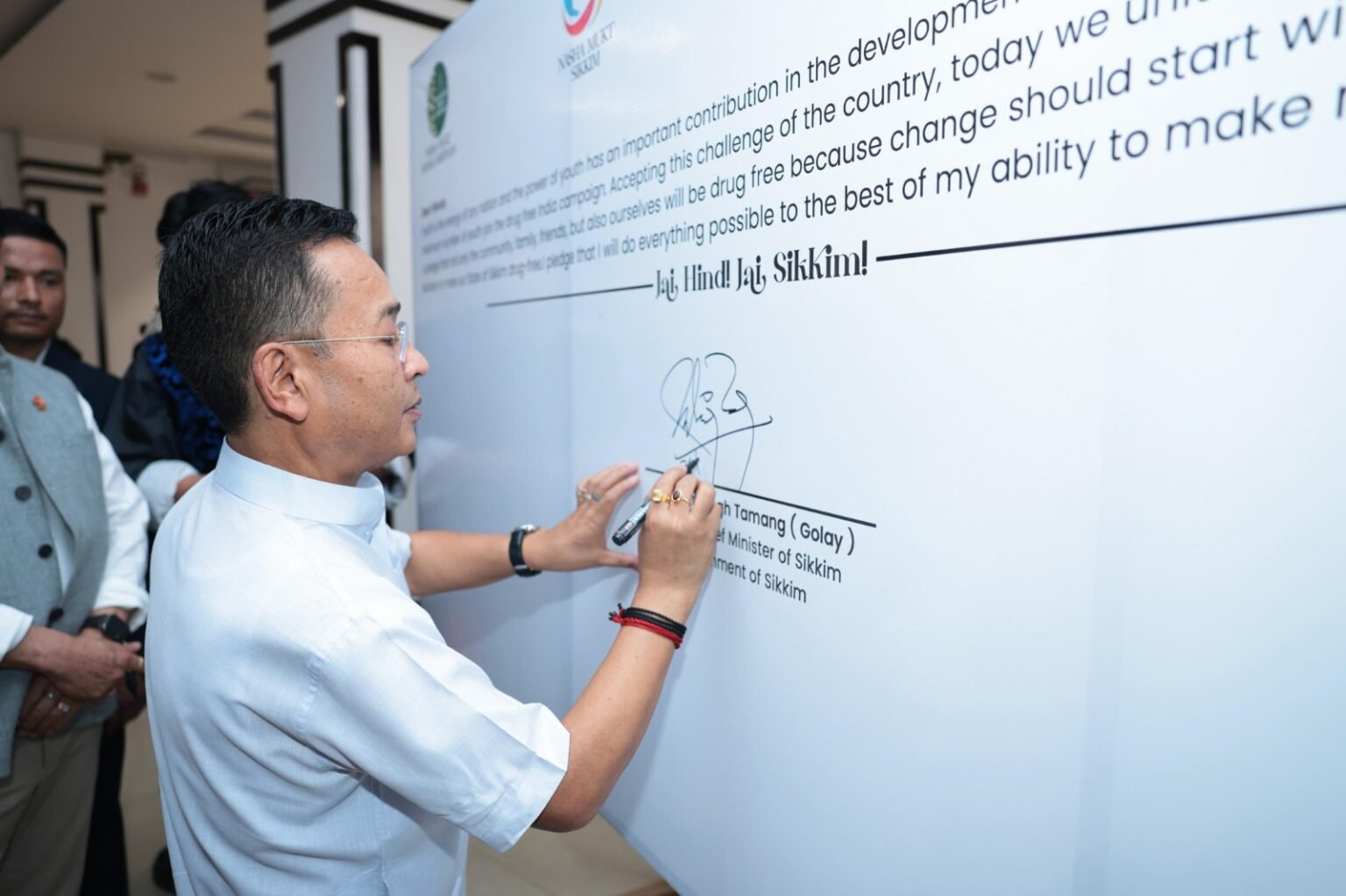GANGTOK: The Social Welfare Department, Government of Sikkim, observed the “International Day against Drug Abuse and Illicit Trafficking” under the United Nations theme, ‘Breaking the Chains: Prevention, Treatment, and Recovery for All,’ here at Manan Kendra on Thursday.
Chief Minister Prem Singh Taman, graced the event as the chief guest.
The event began with the Chief Minister flagging off 13 Mini Dumper Resource Recovery Vehicles, handed over by the Social Welfare department to the Rural Development department, funded under the Pradhan Mantri Jan Vikas Karyakram (PMJVK), for advancing sustainable development and inclusive growth.
The Chief Minister, in his address, highlighted the pressing concern of substance abuse, emphasising its far-reaching impact, stating that it not only affects the state or the nation but is a worldwide problem. He stressed the importance of collaborative efforts from the government, communities, and individuals to address this complex issue.
He encouraged citizens to involve themselves in promoting a sense of personal responsibility, stating that his approach aims to create a supportive environment that fosters positive change and helps individuals struggling with substance abuse.
The Chief Minister expressed his gratitude to Sikkim Police, the law enforcement agency, for their efforts in investigating and taking action against drug-related crimes, which is vital in creating a drug-free state.
Likewise, the government has taken several steps in preventing substance abuse, such as regular awareness drives across communities, increased rehabilitation admissions -a sign that more people are choosing life, appointment of Nodal Officers in every department, and ‘Drug-Free Cells’ in offices to be extended to schools in the future, promotion of sports, arts, and cultural activities to engage youth positively, active outreach by volunteers and peer educators to remote areas, SCERT’s ‘Nawa Chetna Module’ empowering anti-drug cells in schools, and strong enforcement by Sikkim Police and Excise Department in curbing trafficking.
Minister Samdup Lepcha emphasised that youth are increasingly vulnerable to drug influence, and therefore highlighted the need to engage youth in prevention efforts, provide support, and promote healthy alternatives.
He applauded the visionary leadership of the Chief Minister for prioritising this issue, which is why the system is doing its best to prevent substance abuse. He suggested that departments hold regular meetings to stay alert and proactive in maintaining a substance-free work environment.
At the onset, MLA-cum-Advisor Pamin Lepcha elaborated on the importance of a collective effort to create a Drug-Free Sikkim through the Nasha Mukt Bharat Campaign. She underscored the four pillars of law: Prevention, Awareness, Enforcement, and Rehabilitation.
Urging citizens to combat substance abuse, particularly cannabis, and suggesting the use of sniffer dogs in each district, Pamin Lepcha also emphasised the need for sustained action, collective effort, and a supportive environment to achieve the vision of a Drug-Free Sikkim.
Director General of Police (DGP) Akshay Sachdeva, in his keynote address, underlined the important role of the Police in the fight against substance abuse. He highlighted crucial law enforcement under two major laws – the Narcotic Drugs and Psychotropic Substances Act (NDPS) and the Sikkim Anti Drugs Act (SADA).
NDPS is a crucial law in India aimed at controlling and regulating narcotic drugs and psychotropic substances. Its enforcement plays a vital role in maintaining public health and safety, as well as in disrupting addiction. NDPS law in Sikkim involves:Investigation and Prosecution; Interdiction and Seizure; International Cooperation; and Prevention and Rehabilitation.
Sikkim introduced the Sikkim Anti Drugs Act (SADA) with the intent to tackle its own distinctive problems with prescription drug use. The Act is implemented by the State Police, with a specific focus on drug-related offences and the rehabilitation of addicts. The Police work alongside other government departments such as the Home Department and the Sikkim State Legal Services Authority (SLSA) to combat drug abuse.
Key aspects of law enforcement under SADA include: Distinction between Peddlers and Consumers; Enforcement Agencies; Collaboration and Coordination; and Public Awareness and Rehabilitation.
During the programme, the gathering participated in a pledge-taking ceremony led by the Chief Minister.
Subsequently, as an initiative by the Social Welfare department, a magazine was released by the Chief Minister titled “Umeed Unbound – Sikkim’s Quest for a Substance-Free Tomorrow.”
- IPR Report




